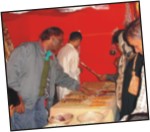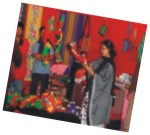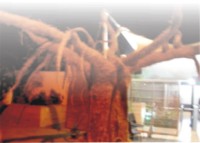| Academic
A Colourful Poush Mela in British Council
Taslima Rawshan Tinni
 On 22nd December, 2006 a colorful Poush Mela (winter fair) was held in British Council. Many people visited and enjoyed the mela. I also had an opportunity to go there. I went there and saw some typical Bangladeshi cultural activities, wonderfully decorated stalls and many more. I want to share my experience of the Mela with all the readers of Star Campus On 22nd December, 2006 a colorful Poush Mela (winter fair) was held in British Council. Many people visited and enjoyed the mela. I also had an opportunity to go there. I went there and saw some typical Bangladeshi cultural activities, wonderfully decorated stalls and many more. I want to share my experience of the Mela with all the readers of Star Campus
Poush Mela 2006 was organized by a foundation named BanglaScot Foundation and the Mela was hosted by the British Council on its grounds and auditorium. This was organized to launch BanglaScot in Dhaka for the first time. BanglaScot Foundation is an international, non-profit arts, culture and community development organisation. It exists as twin Foundations, one based in Dhaka, Bangladesh and the other in Edinburgh, Scotland.
BanglaScot is working in the arena of arts and culture for social change and international understanding. Their program aims to support democratic processes and freedom of expression. They show that arts and culture can and make a real difference. They connect with groups and individuals working in areas such as social justice, development, anti-poverty, the environment, education and human rights.
 The Mela started at 10:00 a.m. and ended at 8:00 p.m. The entrance was stunning as the gates were decorated with art works. When I entered the garden I saw many stalls. The stalls comprising of rickshaw painting, Manipuri crafts, Tribal crafts, Cake stall, Tea stall, Shola craft, Terracotta, Books, Toys etc. There I found 3 persons who had no organized stall but were selling wooden and glass ear rings and bangles sitting on the veranda of British council café. The Mela started at 10:00 a.m. and ended at 8:00 p.m. The entrance was stunning as the gates were decorated with art works. When I entered the garden I saw many stalls. The stalls comprising of rickshaw painting, Manipuri crafts, Tribal crafts, Cake stall, Tea stall, Shola craft, Terracotta, Books, Toys etc. There I found 3 persons who had no organized stall but were selling wooden and glass ear rings and bangles sitting on the veranda of British council café.
In the morning at around 10:00 a.m. some performances were made on Pala gaan, native instrument playing and interesting performance by some monkeys.
In the afternoon, people also enjoyed a traditional puppet show and the snake charming show.
In the evening when the sky became dark, the lights of the British Council garden went off. And then a colorful performance started called “Butterfly-Butterfly”. Only the place where the performance was held was brightly lighted. It was really eye catching with all the performers dressed in different colors of cloths were dancing as butterfly along with music.
 After that I saw another enjoyable performance which we all used to see in the past. Now- a-days it is quite rare in the fairs. It was a puppet show traditionally called as “Putul nach” with a bit of music. After that I saw another enjoyable performance which we all used to see in the past. Now- a-days it is quite rare in the fairs. It was a puppet show traditionally called as “Putul nach” with a bit of music.
Finally, the inaugural ceremony of BanglaScot Foundation took place in British Council auditorium. A renowned singer Mehrin prsented Rabindra sangeet. After she sung the song “Phule Phule“ I came to know that the song's tune was based on the Scottish tune “Ye Banks and Braes”.
People from various parts of the city assembled to celebrate the first month of winter according to Bangla calendar. For me it was a memorable event and I think all the other visitors at this Poush Mela will also agree with me.
(Student of Dhaka University)
Yale makes big changes to MBA program John Christoffersen
 For one group of graduate business students at Yale, next month's lessons will take place on pineapple, banana and coffee plantations in Costa Rica. For one group of graduate business students at Yale, next month's lessons will take place on pineapple, banana and coffee plantations in Costa Rica.
Other Master of Business Administration students are checking out investment prospects in Tanzania and what's sizzling in Singapore.
Yale this year became the first major university to require its MBA students to study abroad. The Ivy League school also replaced finance and marketing courses that have been the mainstay of business education for 50 years with courses structured to mimic the way business managers operate.
"We are at the beginning of what over the next five years will be tremendous change in business education," said Joel M. Podolny, dean of Yale's School of Management.
The changes, implemented this fall, come after criticism in scholarly articles that MBA programs have failed to teach useful skills. Other business schools are implementing or considering similar plans.
Business schools increasingly compete for students and faculty as the number of MBA programs has soared. Universities are trying to differentiate themselves with special programs, such as a growing emphasis on ethics courses in the wake of corporate scandals.
"There is a trend to being responsive to the needs of the marketplace," said Arthur Kraft, chairman of the Association to Advance Collegiate Schools of Business.
Next fall, a new Stanford University curriculum will emphasize the skills a business manager needs and require students to have a global experience. Yale's new curriculum aims to elevate the 30-year-old business program, its newest professional school, into the ranks of elite business schools such as Harvard, Wharton and others. Business Week ranked Yale 19th out of its top 30 MBA programs. Mindful of the global economy, Yale and other business schools are placing more emphasis on studying abroad.
 "I think it's something desired by the students and by the companies," said Douglas Viehland, executive director of the Association of Collegiate Business Schools and Programs, a business education accreditation organization in Overland Park, Kan. "I think it's something desired by the students and by the companies," said Douglas Viehland, executive director of the Association of Collegiate Business Schools and Programs, a business education accreditation organization in Overland Park, Kan.
During the first two weeks of January, Yale students will travel to one of eight destinations around the world for intensive study.They will meet business, government and nonprofit leaders.
The group heading to Africa will visit day care centers to see how the AIDS epidemic is affecting the work force.
Paul Ip is among the students traveling to Costa Rica to check out the plantations and niche markets such as ecotourism as well as explore how globalization affects small countries.
"You can read a lot in books," Ip said. "It's definitely more instructive to be there in person to see what's going on."
The new curriculum includes courses structured around the organizational roles a manager must deal with to solve problems or make progress. There are courses on the employee, the investor, the customer and the competitor.
"No executive wakes up in the morning and thinks, 'I'm going to do finance today,' so it doesn't make sense for students to sit in a finance class and learn to crunch numbers absent of any content," Sharon Oster, an economics professor, said in a statement.
Students still learn the traditional finance and marketing skills, but from the perspective of the employee and others. The customer class, for instance, weaves in not only the traditional focus on marketing but also accounting to determine the value of the relationship, psychology to understand how customers make choices and operations to ensure good service.
"The approach is so much more practical," said Hannah Grannemann, an MBA and drama student who is heading to Japan next month. "Nobody makes decisions in isolation. I'm learning a huge amount."
Effective communication
Amitava Basu
Ability to communicate well is central to becoming successful. Especially, in present times with new technology and the emphasis on teamwork at the workplace, good communication skill is a significant requirement. It is, therefore, important to develop this skill during one's student days.
To start developing communication skill, the first question that you should ask yourself is what it is that you want to communicate. Unless you are clear about what you want to convey, it is likely that you would either be communicating matter that you do not intend or your message is prone to misinterpretation by the audience. Hence, you need to be clear about the subject that you want to convey, and restrict your communication to the main theme instead of dwelling on matters that are redundant.
As a corollary to this requirement, your content needs to have substance. This implies that the subject matter should have rational base and be relevant to the topic that you are addressing.
You need to be brief so that your communication is registered in the minds of the audience. In today's fast life, people neither have the protracted time nor long attention span to listen to a lengthy monologue.
Another important aspect of effective communication is listening to what the other person is saying. This helps to appropriately respond and to convincingly convey your message.
Remember that even if you are clear about what you want to convey, the content has substance and is brief, your communication may still fall flat if you are unable to connect to the audience. You need to be aware of the understanding level of your audience. For example, some may understand simple language; while for others technical jargons and acronyms may be easy to comprehend. You need to pick your words depending on with whom you are communicating.
Do not forget that you should be confident in your delivery. If your communication carries indications of hesitation or lack of conviction, your message would not have the intended force and would not yield the desired effect on the audience.
You can master all these traits of effective communication through regular practice with your friends, colleagues, teachers and parents. As days pass, observe their reactions to check how your communication is creating impact on them and take corrective measures.
A final word never discontinue communication. When some adverse situation occurs, the natural instinct is to close ranks.
Work vigorously to contain the damage and set the situation back to normal and productive mode. Mirza Ghalib, the famous Urdu poet of the 18th Century, wrote even if no relationship exists except quarrel, it is not insignificant because there is no reason to stop communication. So, communicate, communicate and communicate.
Copyright
(R) thedailystar.net 2006 |
